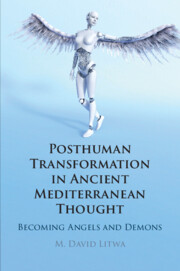Book contents
- Posthuman Transformation in Ancient Mediterranean Thought
- Posthuman Transformation in Ancient Mediterranean Thought
- Copyright page
- Epigraph
- Dedication
- Contents
- Acknowledgments
- Abbreviations
- Introduction
- Chapter 1 Hesiod and Daimonification in the Archaic and Classical Periods
- Chapter 2 Empedocles as Daimon
- Chapter 3 Plato and the Moralization of Daimonification
- Chapter 4 Daimonification in Xenocrates, Plutarch, Apuleius, and Maximus of Tyre
- Chapter 5 Moses Angelified in Philo of Alexandria
- Chapter 6 Origen, Angelification, and the Angelified Jesus
- Chapter 7 Plotinus as a Living Daimon
- Chapter 8 The Angelification of Zostrianos
- Conclusion
- Select Bibliography
- Index
Chapter 3 - Plato and the Moralization of Daimonification
Published online by Cambridge University Press: 24 December 2020
- Posthuman Transformation in Ancient Mediterranean Thought
- Posthuman Transformation in Ancient Mediterranean Thought
- Copyright page
- Epigraph
- Dedication
- Contents
- Acknowledgments
- Abbreviations
- Introduction
- Chapter 1 Hesiod and Daimonification in the Archaic and Classical Periods
- Chapter 2 Empedocles as Daimon
- Chapter 3 Plato and the Moralization of Daimonification
- Chapter 4 Daimonification in Xenocrates, Plutarch, Apuleius, and Maximus of Tyre
- Chapter 5 Moses Angelified in Philo of Alexandria
- Chapter 6 Origen, Angelification, and the Angelified Jesus
- Chapter 7 Plotinus as a Living Daimon
- Chapter 8 The Angelification of Zostrianos
- Conclusion
- Select Bibliography
- Index
Summary
Adapting certain features of Empedoclean daimonology, Plato formulated a more rigorous theory of daimonification through virtue. He daimonified the soldiers of his ideal republic for their courage, and daimonified rulers (“guardians”) for their wisdom. In his Cratylus, Plato vouched for the daimonification of all people who were noble and wise. Plato’s Timaeus introduced the ultimate democratic principle of daimonification by identifying one’s guardian daimon with humanity’s higher consciousness (or nous).
- Type
- Chapter
- Information
- Posthuman Transformation in Ancient Mediterranean ThoughtBecoming Angels and Demons, pp. 45 - 56Publisher: Cambridge University PressPrint publication year: 2021

